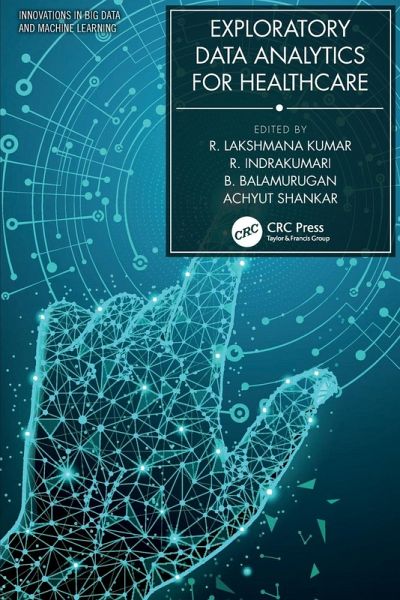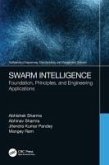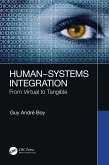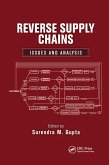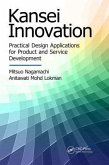Exploratory Data Analytics for Healthcare
Herausgeber: Kumar, R Lakshmana; Shankar, Achyut; Balamurugan, B.; Indrakumari, R.
Exploratory Data Analytics for Healthcare
Herausgeber: Kumar, R Lakshmana; Shankar, Achyut; Balamurugan, B.; Indrakumari, R.
- Broschiertes Buch
- Merkliste
- Auf die Merkliste
- Bewerten Bewerten
- Teilen
- Produkt teilen
- Produkterinnerung
- Produkterinnerung
Exploratory data analysis helps to recognize natural patterns hidden in the data. This book describes the tools for hypothesis generation by visualizing data through graphical representation and provides insight into advanced analytics concepts in an easy way.
Andere Kunden interessierten sich auch für
![Swarm Intelligence Swarm Intelligence]() Abhishek SharmaSwarm Intelligence71,99 €
Abhishek SharmaSwarm Intelligence71,99 €![Human-Systems Integration Human-Systems Integration]() Guy André BoyHuman-Systems Integration92,99 €
Guy André BoyHuman-Systems Integration92,99 €![Automotive Ergonomics Automotive Ergonomics]() Automotive Ergonomics86,99 €
Automotive Ergonomics86,99 €![Reverse Supply Chains Reverse Supply Chains]() Reverse Supply Chains91,99 €
Reverse Supply Chains91,99 €![Kansei Innovation Kansei Innovation]() Mitsuo NagamachiKansei Innovation112,99 €
Mitsuo NagamachiKansei Innovation112,99 €![Interpretation of Algebraic Inequalities Interpretation of Algebraic Inequalities]() Michael T TodinovInterpretation of Algebraic Inequalities68,99 €
Michael T TodinovInterpretation of Algebraic Inequalities68,99 €![Product Design and Factory Development Product Design and Factory Development]() Product Design and Factory Development91,99 €
Product Design and Factory Development91,99 €-
-
-
Exploratory data analysis helps to recognize natural patterns hidden in the data. This book describes the tools for hypothesis generation by visualizing data through graphical representation and provides insight into advanced analytics concepts in an easy way.
Hinweis: Dieser Artikel kann nur an eine deutsche Lieferadresse ausgeliefert werden.
Hinweis: Dieser Artikel kann nur an eine deutsche Lieferadresse ausgeliefert werden.
Produktdetails
- Produktdetails
- Verlag: CRC Press
- Seitenzahl: 292
- Erscheinungstermin: 4. Oktober 2024
- Englisch
- Abmessung: 229mm x 152mm x 17mm
- Gewicht: 413g
- ISBN-13: 9780367506926
- ISBN-10: 0367506920
- Artikelnr.: 71670028
- Herstellerkennzeichnung
- Libri GmbH
- Europaallee 1
- 36244 Bad Hersfeld
- gpsr@libri.de
- Verlag: CRC Press
- Seitenzahl: 292
- Erscheinungstermin: 4. Oktober 2024
- Englisch
- Abmessung: 229mm x 152mm x 17mm
- Gewicht: 413g
- ISBN-13: 9780367506926
- ISBN-10: 0367506920
- Artikelnr.: 71670028
- Herstellerkennzeichnung
- Libri GmbH
- Europaallee 1
- 36244 Bad Hersfeld
- gpsr@libri.de
Dr. R. Lakshmana Kumar is an Assistant professor in the Computer Applications Department and currently also leading the technical training team in Hindusthan College of Engineering and Technology, Coimbatore. Tamil Nadu. His PhD is from Anna University, Chennai and his Research is on Semantic Web Services. Part of his PhD work was funded by South Korea. He is a global chapter lead for MLCS [Machine Learning for Cyber Security] for the Coimbatore chapter. He is currently allied with company-specific training of Infosys Campus Connect, Oracle WDP and Palo Alto Networks. He has a passion for software development and holds an international certification on SCJP (Sun Certificated Java Programmer) and SCJWCD (Sun Certificate Java Web Component Developer). He is familiar with programming languages like Java, Python, and PHP. He is involved with research and considered an expertise in distributed computing. He also holds the Data Science certification from John Hopkins University and the Amazon Cloud Architect certification from Amazon Web Services. He has published more than 25 papers in various international journals. Dr. R. Indrakumari is an Assistant Professor as the School of Computing Science and Engineering, Galgotias University, NCR Delhi, India. She has completed the M.Tech in Computer and Information Technology from Manonmaniam Sundaranar University, Tirunelveli. Her main areas of interest are Big Data, Internet of Things, Data Mining, Data warehousing and its visualization tools such as Tableau, Qlikview. Dr. B. Balamurugan Completed his PhD. at Vellore Institute of Technology University, Vellore and is currently working as a Professor at Galgotias University, Greater Noida, Uttar Pradesh. He has 15 years of teaching experience in the field of computer science. His area of interest lies in the field of Internet of Things, Big data, Networking. He has published more than 100 international journals papers and contributed book chapters. Dr. Achyut Shankar completed his PhD at Vellore Institute of Technology University, Tamilnadu, India and is currently working as an Assistant Professor at Amity School of Engineering and Technology, India. His areas of interested are Data Communication, Computer Networks, Machine Learning, Statistical Tools, Operating Systems, Pattern Recognition, and Theory of Computation.
Chapter 1. Visual Analytics: Scopes & Challenges. Chapter 2. Statistical
Methods and Applications: A Comprehensive Reference for the Healthcare
Industry. Chapter 3. Machine Learning Algorithms for Healthcare Data
Analytics. Chapter 4. A Review of Challenges and Opportunities in Machine
Learning for Healthcare. Chapter 5. Digitalizing the Health Records Using
Machine Learning Algorithms. Chapter 6. Interactive Visualization for
Understanding and Analyzing Medical Data. Chapter 7. Heart Disease
Prediction Using Tableau. Chapter 8. A Deep Learning Framework Using
AlexNet for Early Detection of Pancreatic Cancer. Chapter 9. Applications
of the Map-Reduce Programming Framework to Clinical Big Data Analysis:
Current Landscape and Future Trends. Chapter 10. An Investigation of
Different Machine Learning Approaches for Healthcare Analytics. Chapter 11.
The Potential of Machine Learning for Clinical Predictive Analytics.
Chapter 12. Predictive Analytics in Healthcare Using Machine Learning Tools
and Techniques. Chapter 13. A Collective Study of Machine Learning (ML)
Algorithms and Its Impact on Various Facets of Healthcare.
Methods and Applications: A Comprehensive Reference for the Healthcare
Industry. Chapter 3. Machine Learning Algorithms for Healthcare Data
Analytics. Chapter 4. A Review of Challenges and Opportunities in Machine
Learning for Healthcare. Chapter 5. Digitalizing the Health Records Using
Machine Learning Algorithms. Chapter 6. Interactive Visualization for
Understanding and Analyzing Medical Data. Chapter 7. Heart Disease
Prediction Using Tableau. Chapter 8. A Deep Learning Framework Using
AlexNet for Early Detection of Pancreatic Cancer. Chapter 9. Applications
of the Map-Reduce Programming Framework to Clinical Big Data Analysis:
Current Landscape and Future Trends. Chapter 10. An Investigation of
Different Machine Learning Approaches for Healthcare Analytics. Chapter 11.
The Potential of Machine Learning for Clinical Predictive Analytics.
Chapter 12. Predictive Analytics in Healthcare Using Machine Learning Tools
and Techniques. Chapter 13. A Collective Study of Machine Learning (ML)
Algorithms and Its Impact on Various Facets of Healthcare.
Chapter 1. Visual Analytics: Scopes & Challenges. Chapter 2. Statistical
Methods and Applications: A Comprehensive Reference for the Healthcare
Industry. Chapter 3. Machine Learning Algorithms for Healthcare Data
Analytics. Chapter 4. A Review of Challenges and Opportunities in Machine
Learning for Healthcare. Chapter 5. Digitalizing the Health Records Using
Machine Learning Algorithms. Chapter 6. Interactive Visualization for
Understanding and Analyzing Medical Data. Chapter 7. Heart Disease
Prediction Using Tableau. Chapter 8. A Deep Learning Framework Using
AlexNet for Early Detection of Pancreatic Cancer. Chapter 9. Applications
of the Map-Reduce Programming Framework to Clinical Big Data Analysis:
Current Landscape and Future Trends. Chapter 10. An Investigation of
Different Machine Learning Approaches for Healthcare Analytics. Chapter 11.
The Potential of Machine Learning for Clinical Predictive Analytics.
Chapter 12. Predictive Analytics in Healthcare Using Machine Learning Tools
and Techniques. Chapter 13. A Collective Study of Machine Learning (ML)
Algorithms and Its Impact on Various Facets of Healthcare.
Methods and Applications: A Comprehensive Reference for the Healthcare
Industry. Chapter 3. Machine Learning Algorithms for Healthcare Data
Analytics. Chapter 4. A Review of Challenges and Opportunities in Machine
Learning for Healthcare. Chapter 5. Digitalizing the Health Records Using
Machine Learning Algorithms. Chapter 6. Interactive Visualization for
Understanding and Analyzing Medical Data. Chapter 7. Heart Disease
Prediction Using Tableau. Chapter 8. A Deep Learning Framework Using
AlexNet for Early Detection of Pancreatic Cancer. Chapter 9. Applications
of the Map-Reduce Programming Framework to Clinical Big Data Analysis:
Current Landscape and Future Trends. Chapter 10. An Investigation of
Different Machine Learning Approaches for Healthcare Analytics. Chapter 11.
The Potential of Machine Learning for Clinical Predictive Analytics.
Chapter 12. Predictive Analytics in Healthcare Using Machine Learning Tools
and Techniques. Chapter 13. A Collective Study of Machine Learning (ML)
Algorithms and Its Impact on Various Facets of Healthcare.

